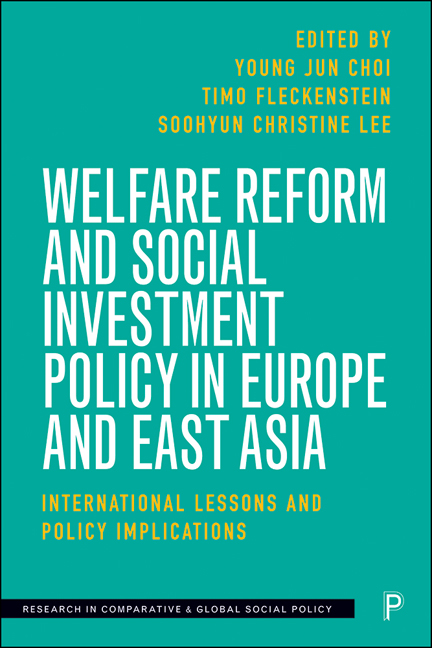 Welfare Reform and Social Investment Policy in Europe and East Asia
Welfare Reform and Social Investment Policy in Europe and East Asia Book contents
- Frontmatter
- Contents
- List of figures and tables
- Notes on contributors
- Acknowledgements
- Preface from the series editors
- 1 Introduction: social investments and welfare reform in Europe and East Asia
- 2 Work–family policy expansion and the idea of social investment: the cases of Germany, England, South Korea and Japan
- 3 Private education in South Korea: lessons for the West from past mistakes?
- 4 How do family background and shadow education affect academic performance and labour market outcomes in South Korea? Reasons for redistributive social investment
- 5 Employability, higher education and the knowledge economy
- 6 Does social investment make the labour market ‘flow’? Family policies and institutional complementarities in Italy, Spain, Japan and South Korea
- 7 The social investment approach and gender division of housework across East Asia and Europe
- 8 Employment outcomes of social investment in latecomer countries
- 9 Estimation of the human capital depreciation rate: an international comparison and policy implications in South Korea
- 10 Changing patterns of grandparenting and their implications for active ageing in England and South Korea
- 11 The governance of social investment policies in comparative perspective: long-term care in England and South Korea
- 12 Towards greater social investments and equality in Europe and East Asia: policies and politics
- Index
1 - Introduction: social investments and welfare reform in Europe and East Asia
Published online by Cambridge University Press: 21 December 2021
- Frontmatter
- Contents
- List of figures and tables
- Notes on contributors
- Acknowledgements
- Preface from the series editors
- 1 Introduction: social investments and welfare reform in Europe and East Asia
- 2 Work–family policy expansion and the idea of social investment: the cases of Germany, England, South Korea and Japan
- 3 Private education in South Korea: lessons for the West from past mistakes?
- 4 How do family background and shadow education affect academic performance and labour market outcomes in South Korea? Reasons for redistributive social investment
- 5 Employability, higher education and the knowledge economy
- 6 Does social investment make the labour market ‘flow’? Family policies and institutional complementarities in Italy, Spain, Japan and South Korea
- 7 The social investment approach and gender division of housework across East Asia and Europe
- 8 Employment outcomes of social investment in latecomer countries
- 9 Estimation of the human capital depreciation rate: an international comparison and policy implications in South Korea
- 10 Changing patterns of grandparenting and their implications for active ageing in England and South Korea
- 11 The governance of social investment policies in comparative perspective: long-term care in England and South Korea
- 12 Towards greater social investments and equality in Europe and East Asia: policies and politics
- Index
Summary
Why social investment?
Across the Organisation for Economic Co-operation and Development (OECD) world, social investment policies are expanding, which Hemerijck (2015) describes as a ‘quiet paradigm revolution’. Nordic countries are widely considered the pioneers in social investment policies – with Sweden having already embarked on progressive policies during the post-war era and thus presenting the longest track record of remarkable social investments (Morel et al, 2012). Much attention has been paid to Sweden's ambitious, active labour market policies, which are aimed at upskilling workers, and the country's employment-oriented family policies (most notably childcare provisions, but also parental leave schemes helping with work–family reconciliation), which promote mothers’ participation in the labour market. In addition to its extensive childcare provisions, the country's comprehensive education and healthcare systems have earned Sweden recognition as a ‘social service state’ (Huber and Stephens, 2001).
While Nordic countries remain the frontrunners, with the greatest financial commitment to social investment policies (Kuitto, 2016), we observe that latecomers from not only Continental Europe and the Anglo-Saxon world, but also East Asia, have made considerable efforts to catch up with the Northern European pioneers. The rise of social investments, especially the expansion of employment-oriented family policy (Lewis et al, 2008; Ferragina and Seeleib-Kaiser, 2015), presents an important dimension of the recent transformation of advanced welfare capitalism, which, despite the prominence of retrenchment, cannot be reduced to welfare state regress. For instance, Germany, which has a long legacy of promoting traditional families, made considerable efforts to expand its childcare provisions (including childcare for those under three years of age), in addition to introducing an earnings-related parental leave scheme that largely resembles the Swedish leave policy. The United Kingdom has also seen a remarkable rise of early childhood education and care, where the government had previously rejected any responsibility for the family because it was considered a ‘private matter’ into which the state had no right to intervene. Childcare policies are also prominently featured in East Asia, even though Japan and South Korea, with their strong Confucian legacies, have had a rather long history of traditional approaches to family that strongly resemble the historical Continental European experience rooted in Catholicism.
- Type
- Chapter
- Information
- Welfare Reform and Social Investment Policy in Europe and East AsiaInternational Lessons and Policy Implications, pp. 1 - 26Publisher: Bristol University PressPrint publication year: 2021


